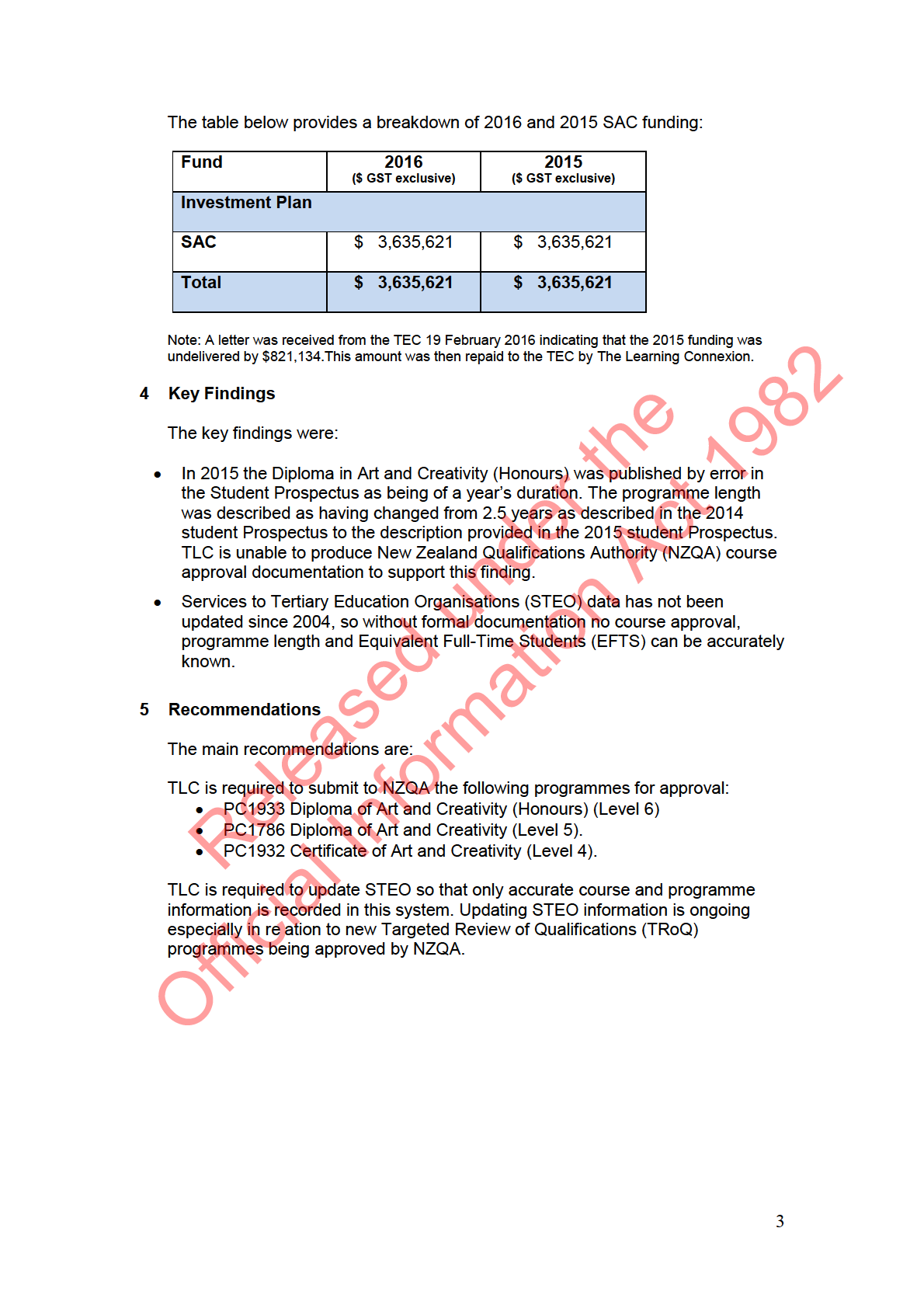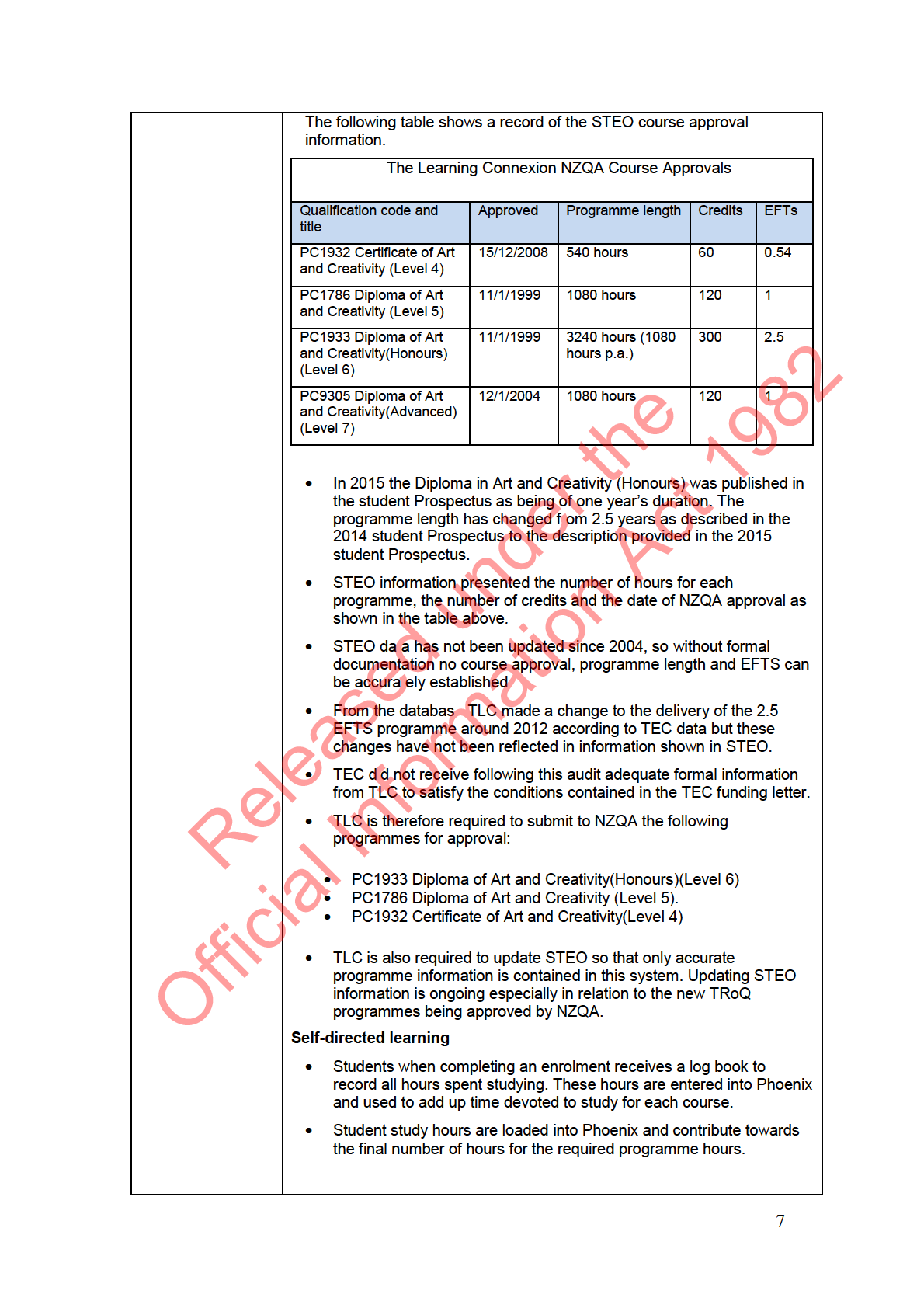
A992909
Tertiary Education Commission
the
1982
Audit Report
Act
under
The Learning Connexion
Student Achievement Component Funding
Released
Information
Official
Edumis Number: 9410
Audit Dates: 7 – 9 June 2016
Draft Report Release Date: 29 June 2016
Final Report Release Date: 25 July 2016
1 Purpose
The purpose of the audit was to provide assurance that The Learning Connexion
is meeting the Investment Plan Funding Conditions as referred to in the Tertiary
Education Commission (TEC) letters of approval dated 21 December 2015
and 4
December 2014. The funding approved includes Student Achievement
Component (SAC) funding.
2 Scope
The scope of the audit was aligned to the performance commitments in the TEC
Investment Plan and the associated funding obligations between the TEC and
The Learning Connexion. The scope was outlined in the audit arrangements
letter.
The focus areas included:
The reporting through the Single Data Return, including recording
enrolments and withdrawals.
The Annual Maximum Fee Movement (AMFM) policy relating to fees and
course costs.
The refund of fees that have been overcharged.
The financial support for the equipment infrastructure equired to deliver
the approved qualifications.
Whether inducements or benefits have been provided to students.
Responsibility for subcontracting arrangements
under the
Compliance with the requirements in Part 18 of the Education Act 1989.
Any other TEC funding matters.
An audit is a snapshot of an organisation s performance at a particular point in
time and may not, as such, provide a view of ongoing compliance. An audit is
based on sampling and issues may remain undetected. The outcome of this audit
wil contribute to decisions made by the TEC relating to current and future
funding.
3 Background
Released
This audit is part of the TEC’s ongoing monitoring of Tertiary Education
Organisations
The Learning Connexion (TLC) is a Private Training Establishment based in
Taita Lower Hutt offering creative art qualifications that are funded by the TEC.
The organisation receives SAC funding for the following:
PC1932 Certificate of Art and Creativity – Level 4
Official Information Act 1982
PC1786 Diploma of Art and Creativity – Level 5
PC1933 Diploma of Art and Creativity (Honours) – Level 6
PC9305 Diploma of Art and Creativity (Advanced) - Level 7.
2


reviewed student NSNs were seldom entered into the section on the
enrolment form. This information assists in the identification of a
student and is from time to time required for reference purposes.
Controls
Take2 had adequate controls in place to protect the integrity of the
data. Access by staff is limited and the sign-off of the SDR is
undertaken by member of the senior executive group. A trial run of
the SDR is undertaken initially and when data has been filtered and
corrected satisfactorily it is then confirmed as being ready for the
sign-off process.
TLC has a backup system in place to use in the event of a data
failure.
2. The Annual
TLC has not provided evidence of NZQA course approval so TEC
Maximum Fee
cannot confirm that there is compliance with the Annual Maximum
Movement
Fee Movement Policy.
(AMFM) policy
relating to fees
The Accounts Department calculate the fees for the current year
and course
according to the AMFM policy and then forward this information to the
costs.
Managing Director for final approval
STEO should then be upd ted with the newly approved fee
information. The increase for 2016 was calculated as being a 3%
increase on the 2015 fee.
Student fee information has not been updated in STEO since 2004.
This is a serious breach and non-c mpliance of SAC funding
under the
conditions
Student fee information is published annual y in the student
Prospectus.
3. The refund of
There was no evidence that a refund of fees was required for a
fees that have
student studying at TLC.
been
overcharged
4. The financial
TLC has a budget to cover both maintenance of equipment and
support for the
capital replacement. There is an ongoing maintenance plan that is
Released
equipm nt
used to ensure all equipment is maintained for classroom teaching at
infrastructure
a high operating level.
required to
deliver the
A replacement budget is discussed with the Managing Director
approved
annually and a replacement plan is then implemented within TLC.
qualific tions.
This includes the selection of all essential equipment including the
cyclical replacement of computers.
A computer specialist has been engaged to upgrade several
computer systems and to rationalise the present use of existing
Official Information Act 1982
student and financial databases.
Personal student costs for specialised clothing and equipment is
required for several programmes.
A student handbook is available for each student once enrolled and
specific course costs for each programme are referred to clearly in
this document.
5
5. Whether
From the sample of records reviewed there was no evidence of any
inducements or
student being provided with an inducement or benefit to enrol in a
benefits have
TLC programme of study.
been provided
to students.
6. Responsibility
TLC does not subcontract any component of the teaching
for
programme.
subcontracting
arrangements.
7. Compliance
The overal standard of recordkeeping was reviewed as satisfactory
with the
requirements
Part 18 of the Education Act 1989 includes, but is not limited t
in Part 18 of
student programme information and records
Education Act
NZQA Course approvals
1989.
The four TLC course approvals, according to STEO were created a
number of years ago and approved by NZQA in 1999.
Significant and minor changes have been app oved but the correct
process has not been followed according to the TEC SAC funding
condition -
SAC3+0 1 TEO to meet requirements when making
changes to a qualification.
under the
A formal record of all qualificati n changes approved by NZQA or
TLC Academic Committee should be retained permanently by TLC.
For the period of the fundi g approval TLC needs to continue to be
quality assured by NZQA. A SAC funding condition
SAC3+003 TEO to be quality assured refers to this condition in the TEC funding letter.
Each year to rec ive TEC funding TLC has agreed to abide by this
condition.
Information relating to the status of each TLC programme cannot be
obtained as TLC has not updated STEO since 2004. The Diploma in
Art and Creativity (Honours) has since 2012, been “unbundled” into a
certificate, diploma and honours diploma programme, but no written
evidence has been produced in either STEO or in TLC documentation
Released
to confirm this decision.
Official Information Act 1982
6

A mentor is responsible for maintaining contact with each student,
providing advice and assisting with setting targets for each project.
Prison education
Prison or Restricted Programme enrolments were equal to 15% of the
total number of student enrolments. The programmes are available at
12 delivery sites and are structured and supervised according to the
TLC distance learning programme requirements.
Students in the Restricted Programme receive documented learning
material and are encouraged by the prison authorities to study and
achieve a qualification.
The Restricted Programme that prison inmates are enrolled in
consists of self-directed learning. A mentor, who is assigned to each
student on enrolment, engages with up to 30 students on a
continuous basis until al have graduated or withdrawn from the
programme.
Student time spent while studying and assessment achieved wh le in
the Restricted Programme is recorded in Phoenix.
Reconciliation
TLC performs internal mode ation of completed student projects to
ensure a consistent stand rd is always achieved across all internal
assessments. A policy is in p ace to guide his process including the
benchmarking of student work to enable consistency of the final level
of competency.
UCOL Institute of Technology has been part of the moderation
under the
process and made a valuable contri ution as an external moderator.
This is relative to self-directed learning where a project may be
completed within a sho ter imeframe according to the timetable.
Funding of the programme may be implicated unless a moderating
process is in place and used regularly to ensure consistency of final
p ojects.
8. Any other TEC
Targeted Review of Qualifications (TRoQ)
funding
matters.
TLC has a representative on both the Governance and Operational
groups and has assisted with establishing a creativity discipline that is
recognised and able to register unit standards on the New Zealand
Released
Qualification Framework.
The newly developed qualifications are expected to be introduced as
new programmes in 2017.
TLC is to use the arrangements for existing students to grandparent
their present study achievements into the new qualifications as
described in the new programme regulations.
Official Information Act 1982
8



